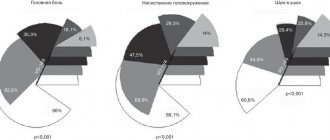How does Fluoxetine work?
Fluoxetine (Prozac) blocks the flow of serotonin back into neuronal synapses (where nerve cells connect to each other). As a result, the content of this mediator (a substance involved in the transmission of nerve impulses) in the connecting elements increases significantly, so over a long period of time it manages to influence the postsynaptic areas, causing characteristic changes. This shows up:
- Stimulating effect on the nervous system
- Improved mood
- Activation of mental processes
- Suppressing anxiety and worry
- Decreased appetite, ultimately leading to weight loss.
In addition to inhibiting serotonin uptake in nervous tissue, Fluoxetine has a similar effect on platelets, reducing their aggregation (gluing) ability. This positive effect helps prevent thrombosis in patients at risk. But this property is not used as the main therapeutic effect; it is a “pleasant” addition to antipsychotic effects.
An important advantage of this antidepressant is the lack of sedation. Therefore, Fluoxetine (Prozac) can be used by persons engaged in precise work that requires care:
- Drivers
- Jewelers
- Aviation industry, etc.
Is there a problem with drug addiction in the family? Contact a private anonymous clinic
What are the consequences of taking Prozac for a long time?
Over time, destructive processes develop throughout the patient’s body. Almost all organs are affected. The symptomatic picture appears:
- paranoid disorders;
- generalized convulsive syndrome;
- muscle atrophy due to appetite suppression;
- excessive salivation;
- sphincter disorders (fecal and urinary incontinence);
- various skin rashes;
- sexual problems;
- formation of blood clots and malnutrition of the heart muscle, arrhythmias;
- anemia.
Consequences of Fluoxetine - existing risks of taking
Taking the drug may cause side effects. They are polysystemic, i.e. can affect any system of the body. Clinically expressed by the following conditions:
- Manic stalking
- Suicidal tendencies
- Dizziness
- Shiver
- Convulsions
- Poor appetite
- Diarrhea
- Increased salivation
- Heart rhythm disturbance
- Urinary retention or incontinence
- Sexual dysfunction
- Allergic rashes.
Therefore, any discomfort and deviations in habitual behavior during treatment with Fluoxetine require consultation with a doctor. Such patients may need to adjust the dose of the antidepressant or replace it with another drug.
Allergic rashes are a common side effect of the drug fluoxetine.
Prozac®
Suicidal risk
Depression is associated with an increased risk of suicidal ideation, self-harm (self-harm), and suicidal events. This risk persists until stable remission occurs. Since improvement may not occur during the first few weeks of treatment, careful monitoring by the attending physician is necessary until the patient's condition improves. Clinical practice shows that the risk of suicide may increase in the early stages of recovery.
Other psychiatric diseases for which Prozach® is prescribed may also be associated with an increased risk of suicidal events. In addition, these diseases can accompany major depressive disorder. Therefore, the same caution should be exercised when treating patients with other psychiatric illnesses as when treating patients with major depressive disorder.
Patients with a history of suicidal behavior who clearly exhibit suicidal ideation before treatment are at increased risk for suicidal ideation or behavior. These patients should be closely monitored during therapy.
A meta-analysis of placebo-controlled clinical trials of antidepressants used to treat psychiatric conditions in adult patients found that among patients younger than 25 years, antidepressant use is associated with an increased risk of suicidal behavior compared with patients receiving placebo.
Patients, particularly those at high risk of developing suicidal behavior, should be closely monitored, especially during the early stages of treatment and during subsequent dose changes. Patients (and their caregivers) should be warned to monitor for any clinical deterioration, monitor for the occurrence of suicidal behavior or thoughts, and unusual changes in behavior, and should contact their healthcare provider immediately if these symptoms occur.
Cardiovascular effects
QT prolongation may occur with fluoxetine, and ventricular arrhythmias or torsade de pointes (TdP) have been reported during post-marketing studies of fluoxetine. Fluoxetine should be used with caution in patients with congenital long QT syndrome, acquired long QT syndrome (for example, while taking fluoxetine with drugs that prolong the QT interval), if there is a history of indications of an increase in the duration of the QT interval in the patient's relatives, with other clinical conditions predisposing to the development of arrhythmia (for example, with hypokalemia, hypomagnesemia, bradycardia, acute myocardial infarction, decompensated heart failure) and with increased exposure to fluoxetine (for example, with reduced liver function). Patients with stable heart disease should undergo an ECG examination before starting fluoxetine therapy. If signs of arrhythmia develop during therapy, fluoxetine should be discontinued and an ECG study performed.
Skin rash
In patients taking fluoxetine, skin rash, anaphylactic reactions and progressive systemic disorders, sometimes serious involving the skin, kidneys, liver and lungs, have been reported. If a skin rash or other possible allergic reactions occur, the etiology of which cannot be determined, fluoxetine should be discontinued.
Epileptic seizures
As with other antidepressants, fluoxetine should be used with caution in patients with a history of seizures. Fluoxetine therapy should be discontinued if epileptic seizures develop in any patient. Also, fluoxetine therapy should not be prescribed to patients with unstable epilepsy; patients with controlled epilepsy require careful monitoring.
Electroconvulsive therapy
In patients receiving electroconvulsive therapy, prolonged seizures have been reported in rare cases while receiving fluoxetine. Caution is recommended when administering fluoxetine to these patients.
Mania
Antidepressants should be used with caution in patients with a history of mania/hypomania. Fluoxetine, like any antidepressant, must be discontinued if the patient is in a manic state.
Akathisia/ psychomotor restlessness
The use of fluoxetine leads to the development of akathisia, which is manifested by subjectively unpleasant sensations or restlessness, the need for constant movement, often without the ability to sit or stand still. Most often, such phenomena are observed during the first few weeks of treatment. In patients with these symptoms, increasing the dose of fluoxetine may have negative consequences.
Withdrawal symptoms
Withdrawal symptoms were common when fluoxetine therapy was stopped, especially when discontinued abruptly. In clinical studies, approximately 60% of patients developed various adverse events when therapy was discontinued, both in the fluoxetine group and in the placebo group. In the fluoxetine group, 17% of these events were severe, and in the placebo group - 12%.
The risk of developing withdrawal symptoms depends on several factors, including duration of therapy, dose, and rate of dose reduction. The most commonly reported symptoms were dizziness, sensory disturbances (including paresthesia), sleep disturbances (including insomnia and vivid dreams), asthenia, anxiety or agitation, nausea and/or vomiting, tremor and headache. Typically these episodes were mild to moderate in severity, but in some patients they could be more severe. In most cases, these phenomena resolve on their own within two weeks, but sometimes they can last longer (2-3 months or more). Therefore, withdrawal of fluoxetine therapy should be done gradually over one or two weeks, depending on the patient's needs.
Tamoxifen
Fluoxetine, as a potent inhibitor of the CYP2D6 isoenzyme, can lead to a decrease in the concentration of endoxifen, one of the most important active metabolites of tamoxifen. Therefore, fluoxetine should be avoided during tamoxifen therapy.
Weight loss
When using fluoxetine, patients may experience a decrease in body weight, however, this is usually proportional to the initial average body weight.
Hyponatremia
There have been cases of hyponatremia (in some cases, serum sodium levels were less than 110 mmol/l). Mostly, such cases were observed in elderly patients, in patients receiving diuretics and in patients with a decrease in circulating blood volume.
Diabetes
In patients with diabetes mellitus, hypoglycemia was observed during treatment with fluoxetine, and hyperglycemia developed after discontinuation of the drug. At the beginning or after the end of treatment with fluoxetine, dose adjustment of insulin and/or oral hypoglycemic drugs may be required.
Liver/renal failure
Fluoxetine undergoes extensive metabolism in the liver and is excreted by the kidneys. For patients with severe liver dysfunction, it is recommended to prescribe lower doses of fluoxetine, or prescribe the drug every other day.
When taking fluoxetine at a dose of 20 mg/day for two months in patients with severe renal failure (creatinine clearance < 10 ml/min) requiring hemodialysis, there were no differences in the concentrations of fluoxetine and norfluoxetine in the blood plasma when compared with patients from control group with normal renal function.
Midriaz
Mydriasis has been reported in association with fluoxetine. Caution should be exercised when prescribing fluoxetine to patients with elevated intraocular pressure or patients at risk of developing acute angle-closure glaucoma.
Hemorrhages
Ecchymosis, purpura and other similar disorders associated with increased bleeding have been reported with the use of SSRIs. Ecchymosis has been rarely reported. Other hemorrhagic phenomena (gynecological bleeding, gastrointestinal bleeding, etc.) were observed rarely. Caution should be exercised when treating fluoxetine, in particular in patients with concomitant therapy with oral anticoagulants and other drugs that affect platelet function (for example, with atypical antipsychotics such as clozapine, with phenothiazines, with most tricyclic antidepressants, acetylsalicylic acid, non-steroidal anti-inflammatory drugs) , as well as with concomitant therapy with drugs that may increase the tendency to bleeding, and in patients with a history of bleeding.
Phenomena similar in symptoms to serotonin syndrome or neuroleptic malignant syndrome
In rare cases, the development of serotonin syndrome or neuroleptic malignant syndrome associated with fluoxetine has been reported, especially when used together with other serotonergic drugs (including those containing L-tryptophan) and/or antipsychotics. Because these syndromes can lead to life-threatening conditions, fluoxetine therapy should be discontinued if a combination of symptoms such as pyrexia, rigidity, myoclonus, autonomic nervous system disorders, mental status changes including confusion, irritability, extreme agitation with possible development of delirium and coma occur. , and prescribe the necessary symptomatic therapy.
All patients taking antidepressants for any indication should be closely monitored for signs of clinical worsening, suicidal ideation, and unusual behavioral changes, especially during the first months of therapy or during dose changes (increases or decreases).
Indications for use
Indications for taking Fluoxetine (Prozac) should only be determined by a doctor. Self-treatment with these antidepressants is prohibited, because they have a number of contraindications and side effects. The need to use Fluoxetine and its substitutes exists when a person suffers from certain mental disorders, namely:
- Depression (regardless of its cause)
- Neurosis, manifested by a strong increase in appetite, leading to obesity
- Obsessive states with constant checking of what has been done.
Instructions for use
Prozac comes in tablet form and is taken orally. The tablet must be taken without chewing, with a sufficient amount of water. The minimum dose is 1 tablet of 20 mg taken once a day. Maximum – 80 mg.
The dose and course of treatment with Prozac are prescribed by a doctor after diagnosing the disease. Approximate and very conditional diagrams are as follows:
- for depression, the initial dose is 20 mg per day, it can be increased if necessary after 3-4 weeks;
- for bulimia nervosa, the dose is 60 mg per day, the dose must be divided into three times;
- for neuroses, 20 to 60 mg of medication per day is prescribed;
- in severe forms of PMS , when depression, attacks of aggression and severe mood swings occur, 20 mg per day is prescribed;
In the presence of concomitant diseases, including liver diseases, as well as when taking other medications, the dose of Prozac must be adjusted downward.
Symptoms of fluoxetine overdose
Exceeding the dose of the drug recommended by the doctor and the frequency of its administration leads to the appearance of a number of symptoms indicating an overdose. In this case, immediate contact with a specialist is required, because the likelihood of death due to complications is high. The main signs indicating fluoxetine poisoning are:
- Mental excitement
- Increased motor activity that does not have any purpose
- Convulsions resembling epileptic seizures
- Arrhythmias of various types
- Cardiopalmus
- Nausea, the climax of which is repeated vomiting.
Nausea and vomiting are signs of fluoxetine overdose
Patients should know that they cannot exceed the recommended dose, much less prescribe the drug themselves, because There is no effective specific antidote. In case of overdose, it is possible to carry out only symptomatic therapy - this is the fight against the clinical signs of poisoning, and not the elimination of its cause (binding of Fluoxetine molecules). Required components are:
- gastric lavage
- prescribing enterosorbents (activated carbon, Enterosgel and others), anticonvulsants and antiarrhythmic drugs.
Special instructions and patients
Patients with liver and kidney problems should take the drug with extreme caution. It is not recommended to take the medicine for epilepsy. And taking the medication in combination with electroconvulsive therapy can generally lead to prolonged epileptic seizures.
Prozac can also change blood glucose levels, so for patients with diabetes it is necessary to adjust the intake of glucose-lowering medications.
Prozac is contraindicated during pregnancy and breastfeeding. The safety of the product when taken by children has not been established. Elderly people need to take the medicine with extreme caution; a special dosage is prescribed for them, which takes into account the individual characteristics of the body.
The simultaneous use of SSRIs and alcohol is unacceptable. Alcohol must be strictly avoided during treatment.
Also, during the treatment period, it is better to refrain from life-threatening activities, where you must always be collected, and the reaction must be lightning fast.
Scandal around Fluoxetine (Prozac)
Recently, the press discussed the possibility of prescribing fluoxetine in psychiatry. In Europe, a scandal erupted in connection with this, which resulted in a ban on treatment with this drug and withdrawal from the pharmacy chain. In the Russian Federation, similar actions were not followed - it remained in the Register of Medicines Approved for Medical Use.
To avoid the negative consequences of treatment with Fluoxetine, it is necessary to use it only on the recommendation of a doctor.
Therefore, in modern conditions, this antidepressant can only be purchased in the pharmacy chain with a prescription. But there is also the other side of the coin - online pharmacies prohibited by law. In them, the drug is sold illegally - over the counter. It should be remembered that if you purchase the drug without consulting a doctor, the risk of developing fluoxetine addiction is very high. It manifests itself with serious symptoms that a person cannot cope with on his own. An overdose can result in cardiac arrest and death.
Manifestations of narcotic effects
Taking the medicine in combination with a number of drugs enhances the drug effects of the latter. This property is the main reason why people suffering from addiction begin to use this antidepressant. In some cases, even isolated use of a drug can give patients narcotic sensations. This phenomenon becomes the beginning of the formation of addiction. Prozac can cause:
- euphoria and mental comfort;
- psychostimulation;
- exacerbation of all types of sensitivity;
- a surge of mental performance and physical strength.
Efficacy of the drug
Considering the existing risks of treatment with Fluoxetine, a number of studies have been conducted to evaluate the therapeutic effectiveness of this drug and the validity of its prescription. They showed that it has a good ability to relieve anxiety and depression. Therefore, Fluoxetine is widely used in the complex treatment of many psychoneurological disorders. However, there is also conflicting data indicating the high danger of the drug and low effectiveness, comparable to a placebo (dummy). Therefore, the drug should be taken seriously and not taken without a doctor’s recommendation.
Some Notes on the Drug Side of Prozac
Narcologists have different opinions about both the benefits and harms of this pharmaceutical drug. Some believe that the risk of addiction and complications from it is high, others provide evidence in favor of the fact that Fluoxetine is harmless. All over the world, despite the fact that this medicine belongs to “veterans”, millions of prescriptions are still written for its purchase. Prozac has attracted the attention of various specialists due to its connection with suicide attempts described in sources not related to official medicine. According to these statistics, Fluoxetine has caused crimes and a large number of complaints about its side effects. Therefore, before taking this medicine, be sure to consult your doctor.
Find out the cost of addiction treatment







